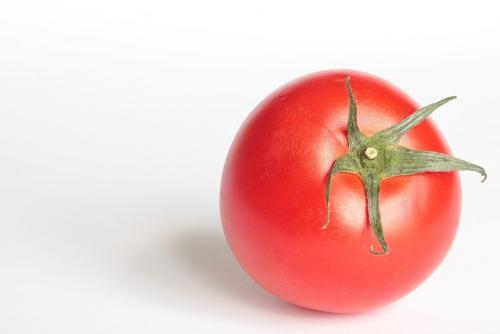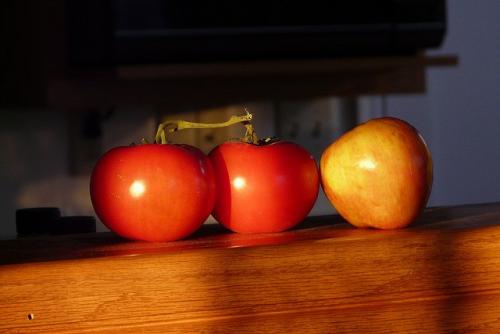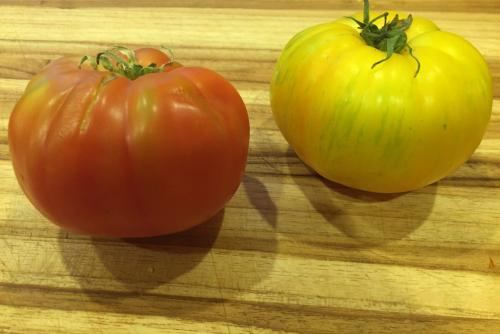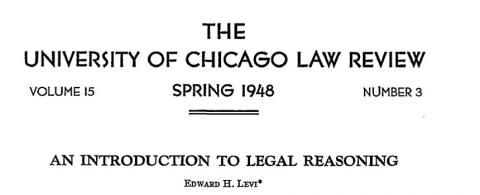Learning to Think Like a Lawyer
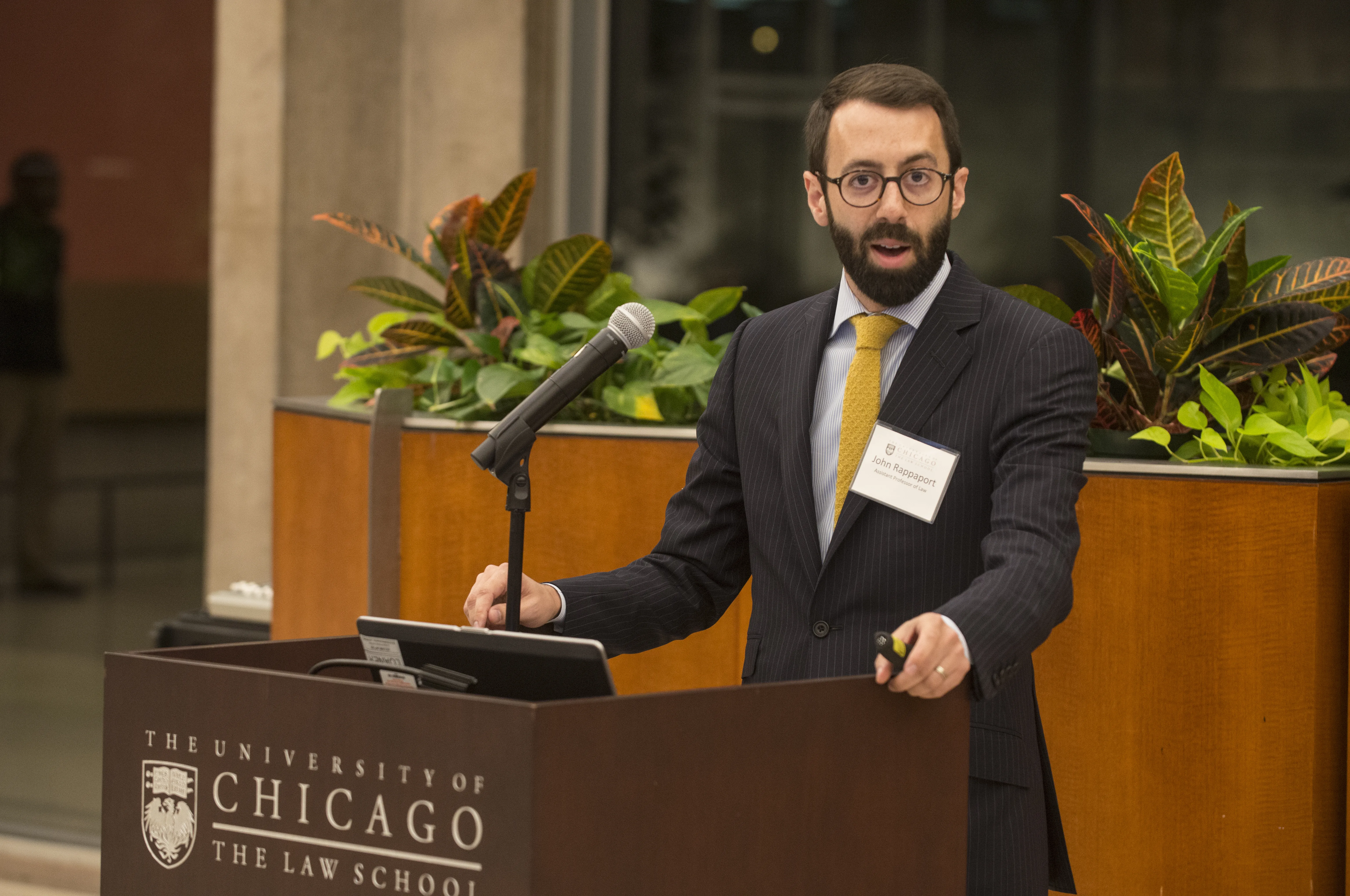
I’m going to use my platform tonight to brag to you about my son, Jonah. He’s my second child. When I started teaching at the Law School, his older sister was about ten months old, and I couldn’t stop talking about her. By the time Jonah came along, the novelty of parenting had begun to fade. Tonight I’ll try to make up for lost time.
Jonah will turn three before too long, and he can do a lot of really cool things. Perhaps the coolest thing is that he can figure out what words mean. Now, you might think this is just a simple matter of association: I point to a tomato on the counter, say “tomato,” and Jonah learns that that thing (which he still won’t put in his mouth) is a tomato. But it’s much more complex than that.
The word “tomato” could refer to tomatoes, but it could also refer to that particular tomato, or any piece of fruit, or any food, or any object. It could refer to the top half of the tomato, or the tomato’s skin, or tomatoes that are sitting on counters, or the color red, or things that are approximately spherical, or shininess. Or “tomato” could mean “Look!” or “I’m hungry.” Or maybe it’s three words: “toe,” “may,” and “toe.” All these possibilities point to the enormous problem facing young Jonah, which is how to use the word appropriately in new circumstances.
Indeed, brilliant as he is, Jonah occasionally over- or underextends a word he’s recently learned. Maybe he’s decided that “tomato” refers to an object that’s red and round and of a certain size. He might then use the word to refer to an apple:
Or he could fail to use it to refer to a green or yellow tomato:
But he gets it pretty quickly. And he can master not only simple nouns but also emotions, directions, movements, and abstractions.
Now, I’ve gotten flak for comparing my law students to my children before, but tonight I am undeterred. The truth is, the more I reflect on my two principal occupations—teaching law students and parenting two young children—the more similarities I see. And just as Jonah astounds me with all he’s mastered in these three quick years, you, too, will amaze us with what you will accomplish in three years’ time. (LLM students, just divide all the numbers I say by three, or substitute “quarter” for “year.”)
You’ve probably heard that law school will teach you to “think like a lawyer” but you don’t yet know what that means. Listen to this classic description of legal reasoning, which was published in The University of Chicago Law Review in 1948. Its author, by the way, Edward Levi, attended the University of Chicago for both his undergraduate and law degrees; taught on this faculty; and was provost and president of the University, as well as Attorney General of the United States.
Levi writes: “The basic pattern of legal reasoning is … reasoning from case to case. It is a three-step process … : similarity is seen between cases; next the rule of law inherent in the first case is announced; then the rule of law is made applicable to the second case.”
Does this remind you of anything? Anything involving tomatoes and apples? Levi goes on: “[T]he scope of a rule of law … depends upon a determination of what facts will be considered similar to those present when the rule was first announced. The finding of similarity or difference is the key step in the legal process…. The problem for the law is: When will it be just to treat different cases as though they were the same?”
When you read your first case for your first law school class, you are Jonah; that case is your red tomato. Then you’ll get to class, and your professor will show you something that kind of looks like red tomato—like a red apple, or a green tomato—and ask you what it’s called. Is it still called “murder” if the defendant intended only to wound the victim rather than kill him? You’ll learn what “murder” is, in other words, by comparing factual scenarios that are murder with ones that are not. Just like Jonah, sometimes you’ll overextend or underextend a concept—calling something “murder” that really isn’t, or vice versa. But it’s in that “process of determining similarity or difference,” as Levi puts it, that “the rules are discovered.”
As I was writing this speech, I pulled one of my wife’s grad school textbooks on child development off the shelf and flipped to the summary of developmental milestones from ages 0 to 3. It turns out to bear a remarkable similarity to the period of life on which you’re about to embark, so I thought I’d give you a little preview of what’s in store.
- Orientation to sounds and sights within range of visual acuity (1 week+)
- The first week or so will be a little disorienting until you get your bearings.
- State modulation begins: alternating states of alertness and habituation to stimuli (1-2 weeks)
- You’ll quickly begin to alternate between states of alertness and spacing out in class.
- Recognition of primary caregiver (1-4 weeks)
- Within a month, you’ll know who’s who around the Law School, at least insofar as it affects you.
- Interactions with caregivers: beginnings of preferential attachments; focusing attention on caregivers for longer periods; social smiling; cooing (1-3 months)
- During the first quarter, you’ll figure out who your favorite professors are, your focus will improve, and you may even start smiling again. Now, I actually omitted a word here from the textbook, but I’d be awfully careful about cooing in the wrong setting around the Law School.
- Sense of self begins to develop, based on feelings of self-efficacy … and self-esteem, when the infant feels successful at accomplishing a goal (6-12 months+)
- With a quarter or two under your belt, you’ll know you can survive law school, and you’ll begin to develop your lawyerly identity.
- Beginning awareness of others’ point of view: joint attention and social referencing (9-12 months+)
- Before you know it, you’ll be at your first summer job, working with other lawyers and law students, gaining exposure to non-Chicago perspectives, and questioning the normality of your 1L experience.
- Imitative learning: watching caregivers to learn how to do things (9-12 months)
- I always notice a big difference between my 1L students and my 2Ls and 3Ls, and I attribute it to the summer work experience, having the chance to see how lawyers do things.
- Intense interest in understanding and learning about the world (1-3 years)
- Many of you will come back to school with renewed vigor and excitement about selecting your own course of study.
- Pretend play: imitation of ordinary activities (pretending to eat) (1 year to 18 months+)
- You may do trial advocacy or moot court during your 2L year.
- Separation-individuation: awareness of psychological differences and autonomy from parents (16 months to 3 years)
- This is when things get fun. During your 3L year—or for the precocious ones among you, your 2L year—you’ll hit your terrible twos. You’ll begin to solidify your own point of view about the law, and to challenge orthodoxy (and the professors who deliver it).
Ultimately, my message for you tonight is this: law school is challenging, but it’s nothing you can’t handle. You’ve been here before. You’ve done this. You know how to think this way. Your minds are capable of tremendous growth and maturation in a three-year period. Your professors won’t always make it easy for you, but that’s because our job is not to spoon-feed the law to you. Instead, as psychologist Alison Gopnik writes of parents, our job is to provide you with “the rich physical and social environments that let [you] exercise [your] own spontaneous learning abilities.”
To be sure, in my tortured analogy, you sit before me tonight as newborn babies. But that’s hardly an insult. As Gopnik puts it, “[w]hat we see in the crib is the greatest mind that has ever existed, the most powerful learning machine in the universe.” In reality, of course, each of you arrives with a wealth of intellectual and life experience. And that experience has “a kind of clarity and intensity precisely because it [i]s uncorrupted” by law school. Come learn the law, in other words, but use it to supplement, not to supplant, everything you already know to be true about the world, and yourselves.
“The most interesting thing about babies,” Gopnik writes, “is that they are so enormously interested; the most wonderful thing about them is their infinite capacity for wonder.” William Wordsworth described early childhood as “a time when meadow, grove, and stream, the earth, and every common sight, to me did seem apparell’d in celestial light.” As you begin your legal studies, be like young Wordsworth—allow yourself to marvel in what you encounter. After all, as Wordsworth elsewhere famously wrote—in highly gendered language—“the child is father of the man.” Who you are as a lawyer will be the product of habits and attitudes you develop in your three years here at Chicago. I hope you set yourself up now for a long and fulfilling career.
